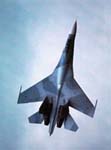
The Rediff Special
A whiff of corruption to the Sukhoi-30 deal
Major General Ashok K Mehta
 When then Indian prime minister Deve Gowda visited Russia earlier this year, he signed a deal to purchase 40 Sukhoi-30 aircraft costing Rs 63.3 billion. Now the whiff of corruption is evident with talk of middlemen and kickbacks doing the rounds. Worse, the aircraft for which an agreement was made in such haste is not even as good as the competition.
When then Indian prime minister Deve Gowda visited Russia earlier this year, he signed a deal to purchase 40 Sukhoi-30 aircraft costing Rs 63.3 billion. Now the whiff of corruption is evident with talk of middlemen and kickbacks doing the rounds. Worse, the aircraft for which an agreement was made in such haste is not even as good as the competition.
After Bofors entered the glossary of weapon scandals, Sukhoi is next. The defence minister has claimed that there were no kickbacks or middlemen in the Rs 63.3 billion purchase of 40 Sukhoi-30 (Su-30K) aircraft from Russia. But those familiar with procurement procedures assert that agents and kickbacks are inevitable.
When I was in Moscow recently, I was told how President Boris Yeltsin's personal emissary has done the rounds of Delhi since 1994 to clinch the Sukhoi deal and thus revive the cash-strapped Russian aviation industry. Various inducements were offered to the Narasimha Rao government in April, 1996, to secure an advance of Rs 5.5 billion to develop the Su-30. Six months later, additional incentives applied on the Deve Gowda government resulted in the contract being signed and another Rs 12 billion being doled out.
So great was the haste that the ministry of defence, in its latest annual report, put on the cover the picture of the wrong one-seater Sukhoi aircraft.
Last month, the chief of air staff, Air Chief Marshal S K Sareen, visited the Irkutsk Aviation Agency which has already delivered the first eight aircraft in semi-knocked-down condition. The last eight aircraft are expected by 2007.
Also last month, a former C-in-C of the South West Air Command, Air Marshal Brijesh Jayal, said that so far the IAF has been free of any arms scandals like the ones about the HDW submarines and Bofors guns because its arms procurement procedures -- called Air Staff Requirement in IAF parlance -- were sound. But the Su-30 deal was concluded in such haste that it smacked of kickbacks.
A new weapon system is acquired or indigenously produced when a) existing fleet of aircraft has to be phased out and b) when there is a change in threat to national security. Either of these conditions trigger off the ASR. The IAF's long term re-equipment planning policy of 1970-71, introduced by Air Chief Marshal P C Lal, was violated.
As till 1994, there was no ASR even remotely resembling the Su-30, since the operational philosophy of the IAF has been to keep the air space sanitised at the farthest corner of the subcontinent -- requiring an optimum operational range of the existing 300 nautical miles not 1,500 nautical miles of the Su-30.
In December 1993, the then air chief, Air Chief Marshal S K Kaul had described the SU-27 family as irrelevant to the future plans of the IAF. In February, 1994, at the joint seminar of the IAF and the Confederation of Indian Industry the same air chief criticised the Russians for failing to provide critical product support to the IAF and urged them to help.
Curiously, by April, 1994, Kaul had ordered Air Vice Marshal S R Krishnaswamy, vice chief of plans, to evaluate the Su-30. Unprecedented secrecy attended both the preparation of the ASR and the evaluation report. Even more curiously, the Operations Branch who should have initiated the ASR were kept in the dark.
When normally it takes seven to ten years to sign a major contract, in less than two years India signed its biggest weapons deal in history with Russia.
Courtesy: Sunday magazine
Tell us what you think of this report
|



